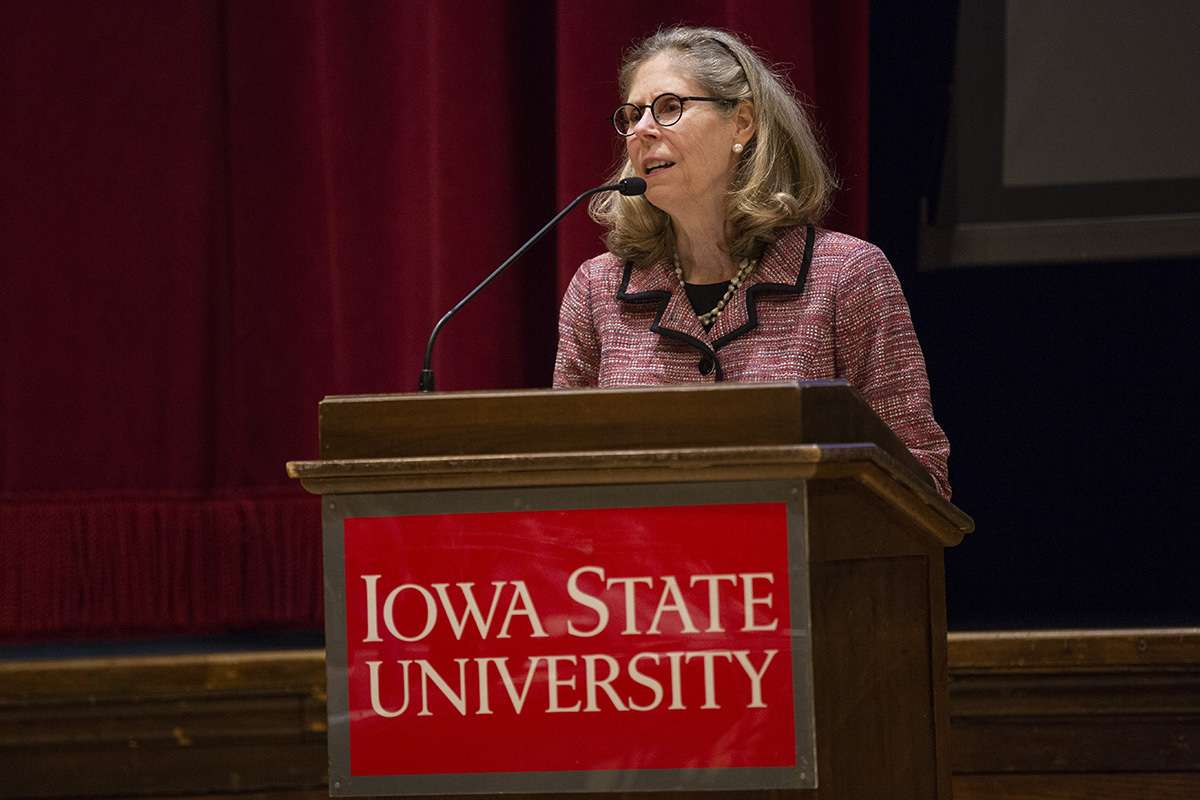Wintersteen provides updates to Faculty Senate
Author: Jeff Budlong
This is an archived story. The content, links and information may have changed since the publication date.
Author: Jeff Budlong

President Wendy Wintersteen speaks to the Faculty Senate in the Great Hall on Tuesday. Photo by Christopher Gannon.
President Wendy Wintersteen addressed the Faculty Senate on several key issues during its Feb. 11 meeting. During her remarks, Wintersteen focused on legislative requests for the upcoming year, enrollment, further implementation of Workday and improved service delivery, inclusive classroom training and the Innovate at Iowa State campaign. Below are a few of her comments.
"We are hopeful we will get the full $7 million that Iowa State has requested from the Legislature. This is all about having the funds to support student success and our faculty and staff."
"We also are focusing on advancements for the state's bioeconomy to bring research funding to the university in three specific areas -- biobased chemicals and products, vaccines and immunotherapeutics, and precision and digital agriculture. Last year we got a little bit of funding, so this year we are hoping to go back and get the rest of the $3 million."
"In 2016, we had our all-time high of 36,660 students and since that time we have seen it drop down to 33,391. That, of course, leads to dropping revenue. We certainly anticipated a leveling off of numbers, even a slight drop. One of the surprises was the large number of international students we lost over a couple of years. It was related to the climate of the country, trade war and tariffs."
"We moved student recruitment and admissions from student affairs to the provost's office. The importance of that move was not just the alignment of best practices, but the clarity it brought to our colleges and departments that faculty and staff who are really engaged with our students are most responsible and understand the recruiting of those students."
"This has been a year of unprecedented change when we think about enterprise management system, finance and human resources. For our faculty, I recognize this has been not only a year of extraordinary cultural change, but a year of frustration, a year of stress. We want to continue to hear and improve."
"Thank you to all of you who have or will participate in the inclusive classroom training. By the end of the spring semester, every department will have completed the training."
"Innovate at Iowa State will be helpful in our efforts to recruit students to come and study here. It is one of those things that will differentiate us from other universities."
Senators approved four universitywide student learning outcomes to bring Iowa State in line with Higher Learning Commission (HLC) accreditation criteria. The four measures are:
The data to measure the success of each outcome is already available to the registrar. Colleges and programs are able to asses outcomes that are separate from what is reported to the HLC.
Michael Bugeja, professor in the Greenlee School of Journalism and Communication, spoke about department-level diversity plans. Recommendations in 2004 to deans and the president's office were designed to bring all departments into alignment on diversity issues and deans to provide guidelines for inclusion of diversity in department mission statements, strategic plans and stand-alone policies.
A 2016 survey found a decrease in mentions of diversity in mission statements, from 35% to 30%. Diversity mentions in strategic plans grew from 55% to 64%, and in stand-alone plans or policies it grew by two percentage points, to 17%.
He outlined six reasons diversity plans are important:
Bugeja said diversity plans allow for a bottom-up approach and give departments a measure of accountability. Diversity plans also can help recruit and retain underrepresented groups.
"I would like to see every academic unit discuss the possibility of a diversity plan," Bugeja said. "We have had diversity training in every department, and that is a very important component, but I worry about what happens when the training is done because there might not be an assessment vehicle."
Senators will vote next month to change the name of the last full week of classes before finals from dead week to prep week in the Faculty Handbook. The Graduate and Professional Student Senate adopted a resolution to rename the week.
The senate will take action next month on four proposals: